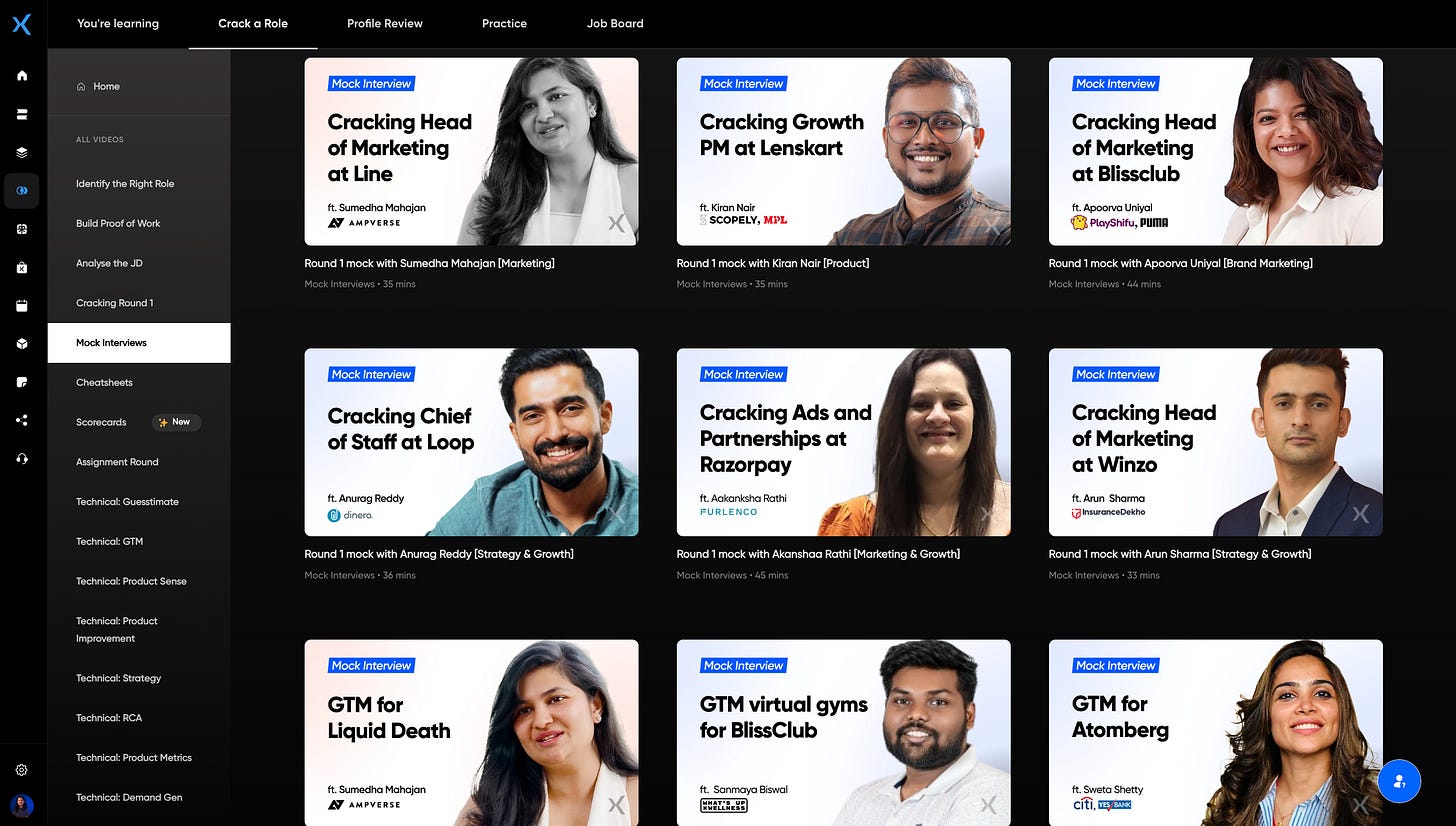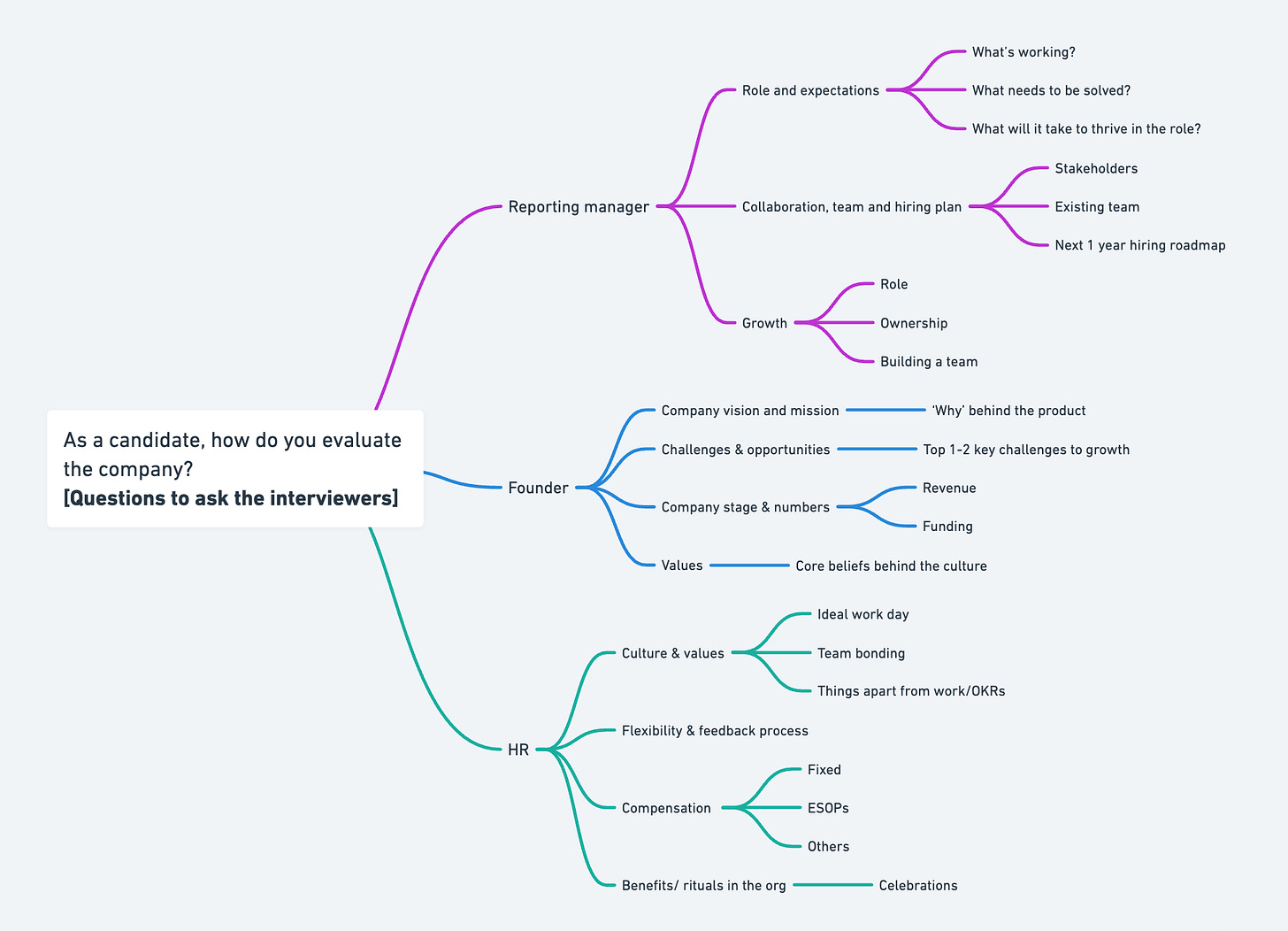Interviews are a two-way street
While they are evaluating you, how do you ask the right questions to the right person, and evaluate them?
Learn the best interview practices
The only experience you have in interviews is the ones you have given, but what if you can also observe and learn from a live interview? Things that you usually miss out on when you are the candidate can be easily understood when you watch an interview happening in front of you.
In these videos, you will get insights into how to tackle questions, structure you responses, and handle interview dynamics. Along with practicing for interviews, this is an incremental way to refine your communication skills, manage anxiety, and avoid the common mistakes.
To help you understand how to approach Round 1/GTM Interviews, we have members from the fam [the candidate] answering the most commonly asked questions & tackling tricky questions on spot, followed by feedback from AP [the interviewer] that you can learn from too.
now, getting to today’s topic
Interviewing is not just about selling yourself to the company. It’s equally about evaluating if the company is the right fit for you. 9/10 people overlook this aspect and make decisions based purely on the role title or compensation. But culture fit goes beyond that—it’s about the environment you'll thrive in, the people you'll be working with, and the values the company stands by.
In this edition, you will learn the questions you should be asking during interviews to evaluate culture fit, team dynamics, and long-term growth.
Remember, you’re assessing them just as much as they’re assessing you.
Questions for the reporting manager
Your reporting manager will be your most frequent point of contact, so it’s critical to understand how they work, what they expect, and how they see your role fitting into the team.
Here’s where you ask about the day-to-day realities and team structure.
1/ Role and expectations
How do you see this role evolving over the next year? and what milestones will define this?
What are the most important skills or qualities you’re looking for in someone to succeed in this role?
How will define my success in the first 90 days? And beyond? How does the feedback, reporting structure work?
These questions will help you ensure that your expectations align with those of your manager. It also gives clarity on how success is defined.
2/ Collaboration & team
Can you describe the team I’ll be working with? What’s the team dynamic like?
Who are the primary stakeholders I will collaborate with, and what’s their communication style?
How does the team typically handle feedback and conflict resolution? Which communication channel does this happen over?
By asking about team dynamics, you’ll get insight into the collaborative culture and whether it’s a place where you’ll feel comfortable contributing.
3/ Potential growth
What do you see this role evolve into? Especially over the next 2-4 years.
Are there opportunities to take on more responsibility or work on cross-functional projects?
How does 0-1 experimentation happen in the team currently?
How does OKR planning work? And do we already have a set format of it?
Understanding the growth potential within the company is key if you’re looking for a role where you can evolve and advance. These questions also show that you’re thinking long-term.
Questions for the Founder
When you’re speaking with the Founder, you get the opportunity to understand core values and long-term vision that are driving the company. Founders are often deeply involved in setting the culture and strategic direction, so this is your chance to gauge if their mission resonates with you.
1/ Company vision & mission
What inspired you to start this company, and what is the core mission driving it?
How would you define the company’s ‘why’? What are the key principles that guide decision-making here?
What’s the long-term vision for the company over the next 3-5 years?
These questions help you understand the "why" behind the company, which is crucial in evaluating whether you’ll be excited to contribute to that mission.
2/ Challenges and opportunities
What are the biggest challenges the company is currently facing, and how are you addressing them?
What market trends or shifts are you preparing for?
Founders are typically focused on big-picture challenges and industry-level changes. Their answers will give you insight into whether the company is forward-thinking and adaptable.
3/ Company stage and growth
Would you say the company has reached product-market fit (PMF), or is it still evolving?
What stage of scaling is the company at? How is the company positioning itself to grow over the next few years?
Can you talk about the funding and financial health of the company?
If you’re joining a startup, it’s important to know whether they’re still finding their product-market fit or if they’ve already established a strong footing. Understanding the growth trajectory helps you evaluate your fitment better.
Questions for the HR
HR is your go-to for understanding the culture, company values, and policies that may affect your work and long-term growth. This is also your opportunity to discuss topics like compensation structure.
1/ Company culture and values
What are the company’s core values, and how do they influence everyday work life?
How would you describe the overall culture here? Is it more collaborative or autonomous?
What are some of the rituals that the team does to ensure solid relationship building?
HR will have a broader view of how the culture applies across different teams. Their answers will give you a clear picture of the day-to-day work environment.
2/ Flexibility & feedback
How does the company approach flexibility with work schedules, remote work, or pursuing new initiatives?
What’s the performance review process like? How often can employees expect to receive feedback?
What is the company’s philosophy on internally moving to another roles suitable?
If the chance to grow internally into a more suitable role is important to you, this is the time to ask. Understanding how appraisals work, timelines and process for it - can help you set clear expectations.
3/ Compensation and benefits
Can you walk me through the structure of the compensation package? How are bonuses and incentives structured?
Does the company offer equity or ESOPs as part of the compensation? How is that decided?
What does the benefits include apart from compensation? any policy related to professional development/ learning?
Especially in larger orgs [100+ team members] HR is the best point of contact for any questions related to compensation, equity, and benefits. Make sure you get clear details on what’s being offered, especially around long-term incentives like stock options.
Extremely important
The questions you ask during an interview say as much about you as your answers do. Thoughtful, well-framed questions can reflect your preparedness, curiosity, and alignment with the company’s values. If done right, they help you build a high perceived value as a candidate. But it’s not just about what you ask — how you ask matters too.
Before jumping into your questions, take time to build rapport with the interviewer. Get a feel for the room, gauge the tone, and delight them with your understanding of the company. This sets the stage for a more meaningful and engaging conversation.
Do your research. Skip questions you can easily find online. Instead, dig deeper and focus on things that only an insider can clarify.
Explain the why. Share the reason behind your question to provide context. It shows you’re intentional and thoughtful in your approach.
Ask open-ended questions. Avoid the yes/no questions. Instead ask questions that allow them to open up and give you more than just surface-level answers.
Make sure your questions fit the person you’re speaking to. Ask founders about the vision, managers about day-to-day team dynamics, and HR about policies and growth opportunities.
Be respectful of the interview’s duration. Prioritize your top questions and don’t overwhelm them.
Be honest. Focus on what truly matters to you—whether it’s career growth, flexibility, or team culture. It’s important to get clarity for yourself first. Your non-negotiable will define the questions you ask.
Putting it all together
It’s about the overall fitment, not just the job.
Ultimately, the goal of these questions is to ensure that the company aligns with your values, goals, and working style and vice-versa.
Don’t wait until you’ve joined to ask these things. The more you get clarity on during the interview process, the more empowered you’ll feel to make an informed decision.
Featured roles this week ✨
Marketing Manager and Product Marketing Manager at ALLEN Digital
Both are IC roles, in which you will work closely with Apoorv Sharma, CMO at Allen and ex-Apple, Marketing & communications.
GTM Expert at ContextQA
The ideal candidate will have a proven track record of developing and executing GTM strategies in mid-size to large enterprise segments, particularly in the U.S. region.
Digital marketing manager at GoMarbleAI
Seeking an experienced Performance Marketer to join the team, who will independently handle and grow international accounts with monthly advertising spends >$10,000 / Month
Curated resources for you 🚀
Going from IC to Director of Product, notes from the live session we hosted with Chris, Director of Product at LinkedIn
[Women-circle exclusive] Becoming a CMO, notes from the session
How do you know if you did well in the interview? here’s a playbook
[Resume] We have launched a sub-culture in the community for all things resume, search for #resume-building and join in.
What are some questions you ask in interviews to evaluate the role/org and truly figure if it’s the right place for you?
If you’ve read till here, thank you for sticking through. See you next week.




Asking the right questions can also really help in making a solid impression. This is super helpful!